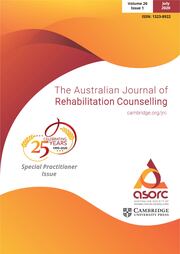Article contents
Distress of the Caregiver in Acquired Brain Injury: Positive aspects of care to moderate the effects of psychological problems
Published online by Cambridge University Press: 07 November 2013
Abstract
Acquired brain injury (ABI) causes numerous problems, including cognitive and personality changes, which can be quite stressful for caregivers. In this study, we aimed to adapt an instrument to measure caregivers’ distress, the Relative Version of the Head Injury Behaviour Scale (HIBS; Godfrey et al., 2003) to the Spanish language and to determine whether the positive aspects of caregiving moderate the effects of the psychological problems of ABI on caregivers’ distress. Moderation analyses indicated that positive aspects of caregiving involving one's outlook on life reduced the association between psychological problems and caregivers’ distress. The findings suggest that although the caregiver role is a source of distress, this role can also become a source of satisfaction, actually contributing to reducing caregivers’ distress. The importance of promoting the positive aspects of caregiving in rehabilitation programmes is discussed.
- Type
- Articles
- Information
- Copyright
- Copyright © The Author(s), published by Cambridge University Press on behalf of Australian Academic Press Pty Ltd 2013
References
- 4
- Cited by


